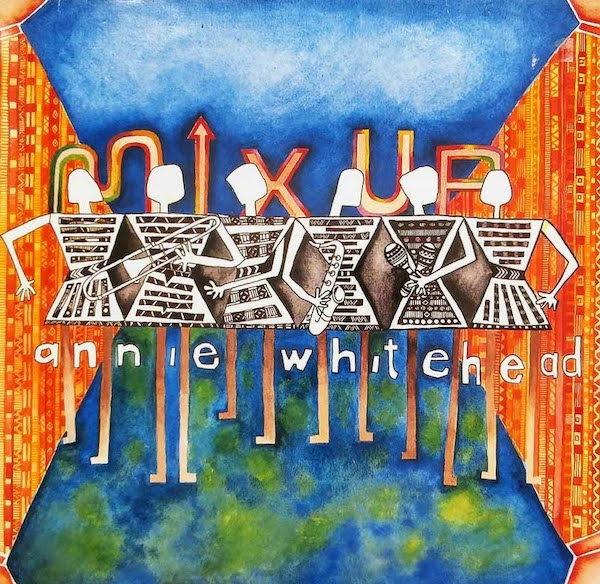
If you can imagine, imagine what it is to be a woman. For those already identifying as one, venture onwards. Then, compound that. Imagine yourself as a trombonist. It’s that choice: to pick up one of music’s longtime bit players — and actually do something meaningful with the instrument — that informs just how interesting what this woman, one Annie Whitehead, accomplished on her musical debut, 1985’s Mix Up. Rooted in dub and experimental styles, it’s a side of jazz that’s a welcome corrective (developed in her own vocabulary) to a whole lot of built-in expectations.
Annie’s roots would be far from the sticky hot climate of the Caribbean her own music reminds us of. It was in the sleepy Manchester suburb of Oldham in Lancashire that Annie picked up the trombone at school and hashed it out as a performer, working as a musician for various brass bands and dance teams.

What changed Annie’s musical career would be taking advantage of an opportunity that famed English bandleader, Ivy Benson, presented for her. Hired at the age of 16 for Ivy’s all-female swing band “The All-Girl Band”, Annie learned quickly the grueling long days of a gigging musician. By the time she was 18 she’d done enough in those two years to know that she’d rather do something else. For nearly six years Annie would quit music altogether.
It would be her discovery of Jamaican reggae and ska music that would bring Annie back to music. In short course, Annie would be hired by myriad popular artists like Elvis Costello, Bill Wyman, Jah Wobble, and Chris Rea, to add that learned, classically-trained side to musicianship that was required to bring such style into a professional music recording studio environment.
Two releases would prove that Annie’s north star was far from what many expected it to be. On her first journey, on 1980’s “Free Town Part 2 & 3” with the short-lived, Dutch, Ram Jam Band she was able to introduce herself to the ideas behind dub-style production technique – something that’d help her when she added her trombone to countless, massive English dancehall tracks on Fashion Records releases. These ideas of echo-laden music editing would prove handy in the future and inspire her run of great session work in tracks by forward-thinking artists like Weekend, The Style Council, and Frank Chickens that were beginning to skirt the lines of jazz, pop, and New Wave.
What could be Annie’s turning point would be her work with an embryonic version of pioneering proto-acid-jazz crew, Working Week. The names on the label probably need no introduction: Robert Wyatt, Tracey Thorn, Julie Tippetts, and Robin Millar. Yet, there was this young gal on trombone who added a certain je ne sais quoi to these ideas on songs like “Venceremos – We Will Win (Bossa)”. There, there was the placeholder for uncategorizable ideas that probably needed their own landing strip to launch to/from.
So, in 1985, just a year removed from the build of Simon Jeffe’s own Broadcasting From Home with the Penguin Cafe Orchestra, Annie would help form the The Massive Horns band and record one of those rare reggae-jazz records that distill all the goodness of all its forms – dancehall, lovers rock, dub, etc. – in an instrumental way. As you can imagine, when Annie struck out truly on her own she’d have all these disparate ideas, influences, and visions to explore and run with.
Under Paladin Records she’d create her debut single, one “Alien Style” a nearly seven minute long tour de force of dub pop that recalled the leftfield dance music of N.Y.C. no-wave group, Maximum Joy and some mutated latin jazz that seemed of another earth. Was this music for the jazz scene or for the dance floor? It seemed like Annie’s own creativity spurred her to venture on some fourth way. What began as her experimenting with multi-track recording and dub editing techniques, ended with what sounded like a strangely intriguing pop tune sung by herself.
It’s that idea of fourth stream jazz – where world music plays a heavy role in the making of forward-thinking music – that starts building all sorts of interesting songs and ideas on what would be her debut album, Mix Up. The 12” version of “Alien Style” opening the album, seemingly, makes such ideas (surprisingly) catchy and immediate. Tracks that followed, like “Pigeon Post”, with fellow female Working Week member and musician Kim Burton, spurred some of the Don Cherry-simpatico comparisons. This is jazz you can dance to, reggae that picks up its one-drop for different reasons.
Deep tracks like “Mozambique” go further beyond, speaking to universal roots music in a way that’s refreshingly bold, unpredictable, and quite heavy. You could probably count on your two hands the number of English musicians influenced by Fela Kuti but on one of them those who could nail the Afro-Funk of tracks like the aforementioned or Annie’s “Freedom Marching” (especially at this time).

Mix Up is a total windup of a record. With every expected theme, you get a curveball like “Time Change”, a song that owes more to England’s early jazz-rock gurus, like Soft Machine and Family. Mingus-like ideas crown “The Badger”. While “Rainy Daze” circles back to the earliest off-shoot of English progressive jazz, the heart-pounding avant-pop of Robert Wyatt. A wonderful collection of such personally brilliant ideas, surely, merits new roots to spring?
